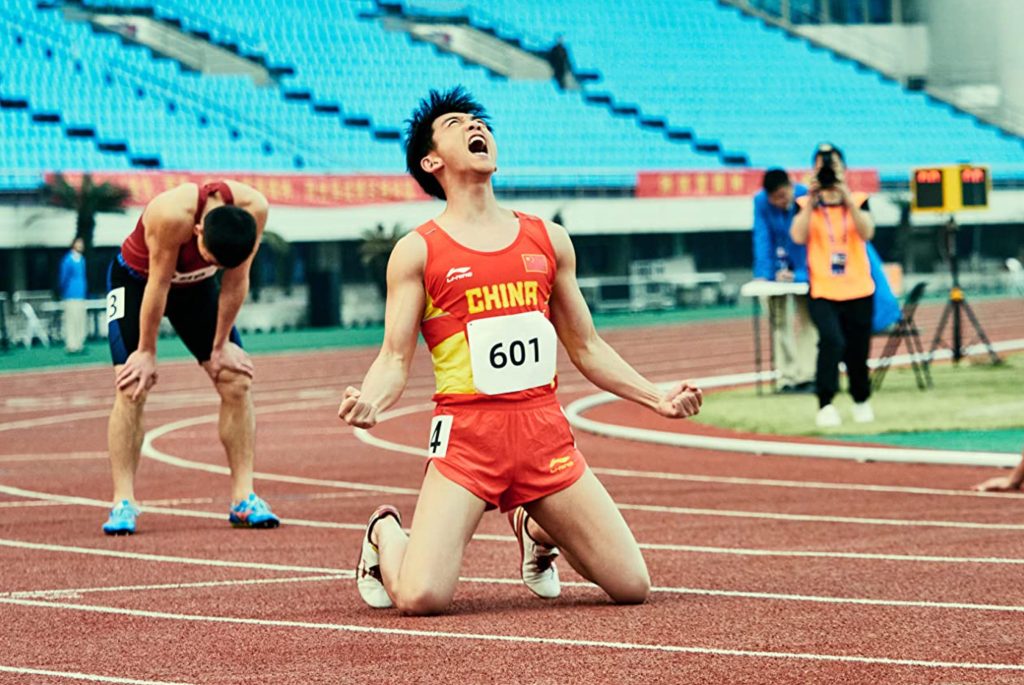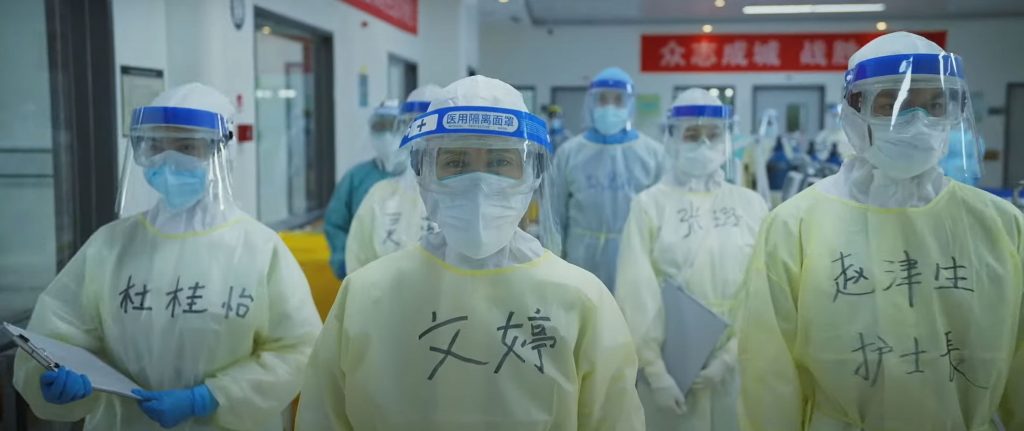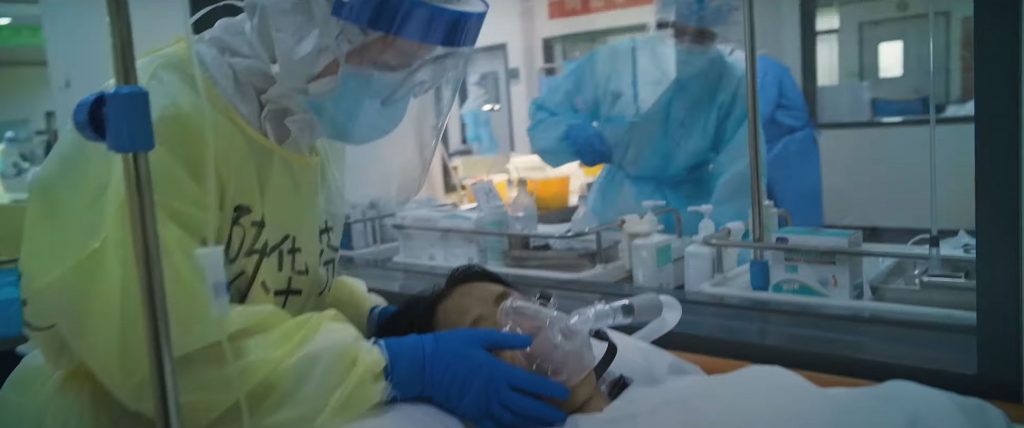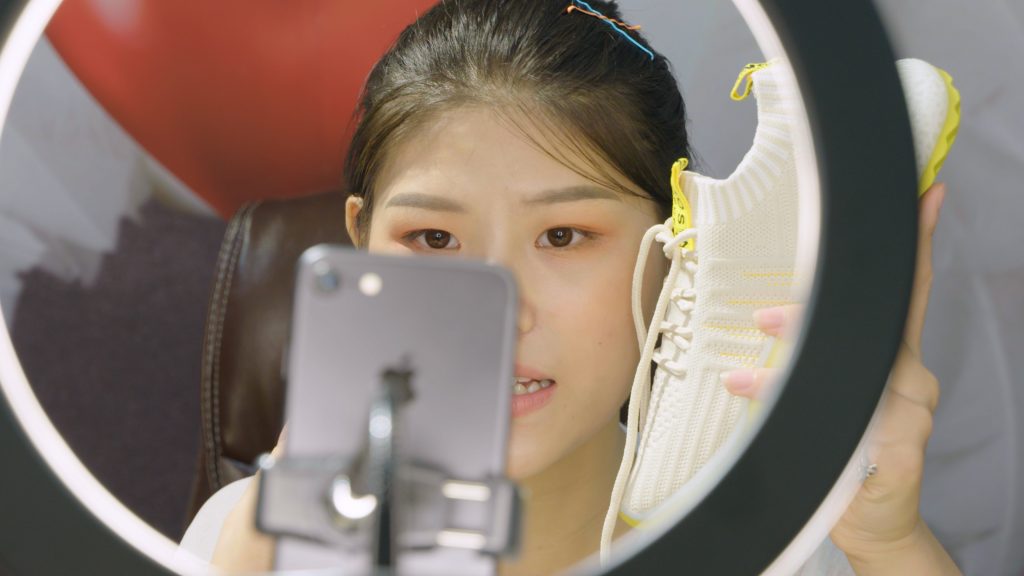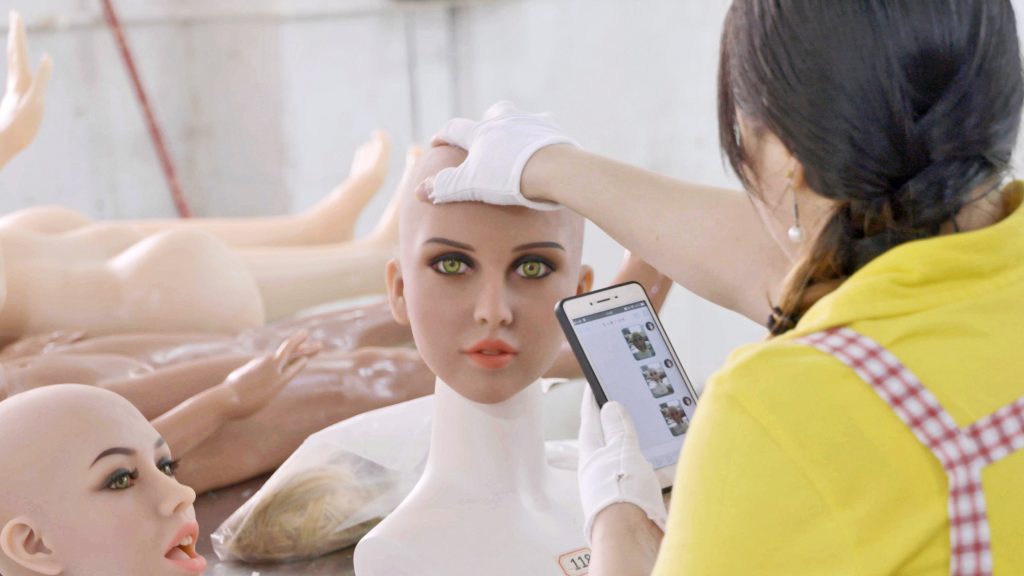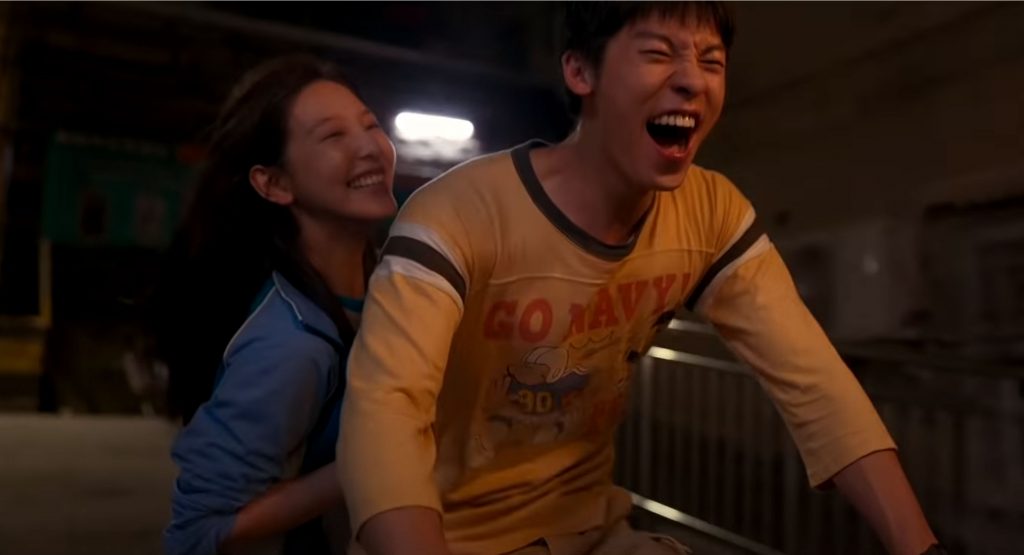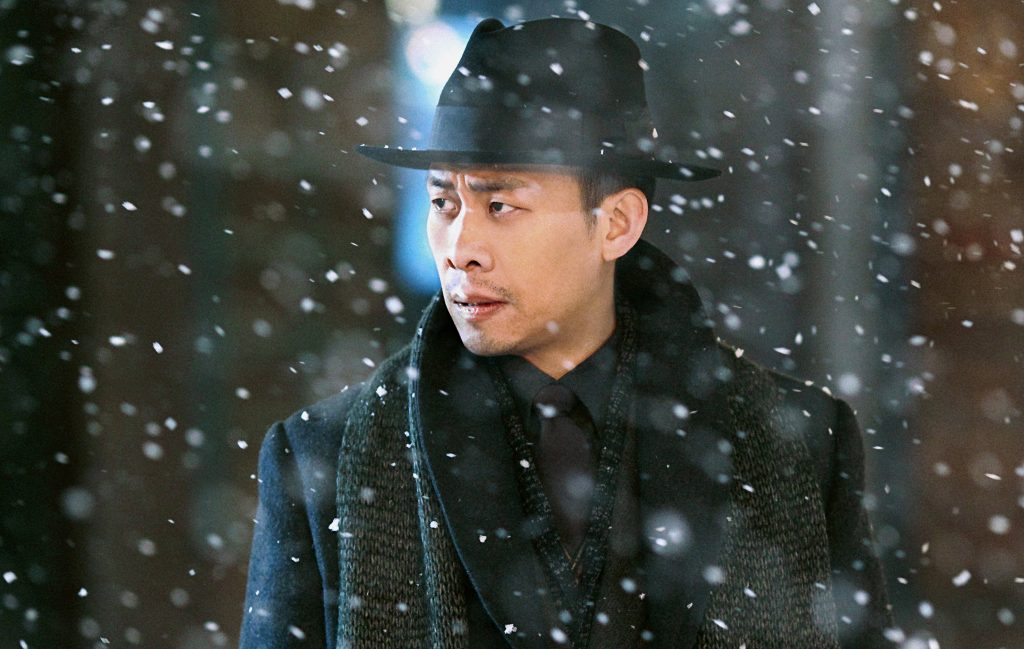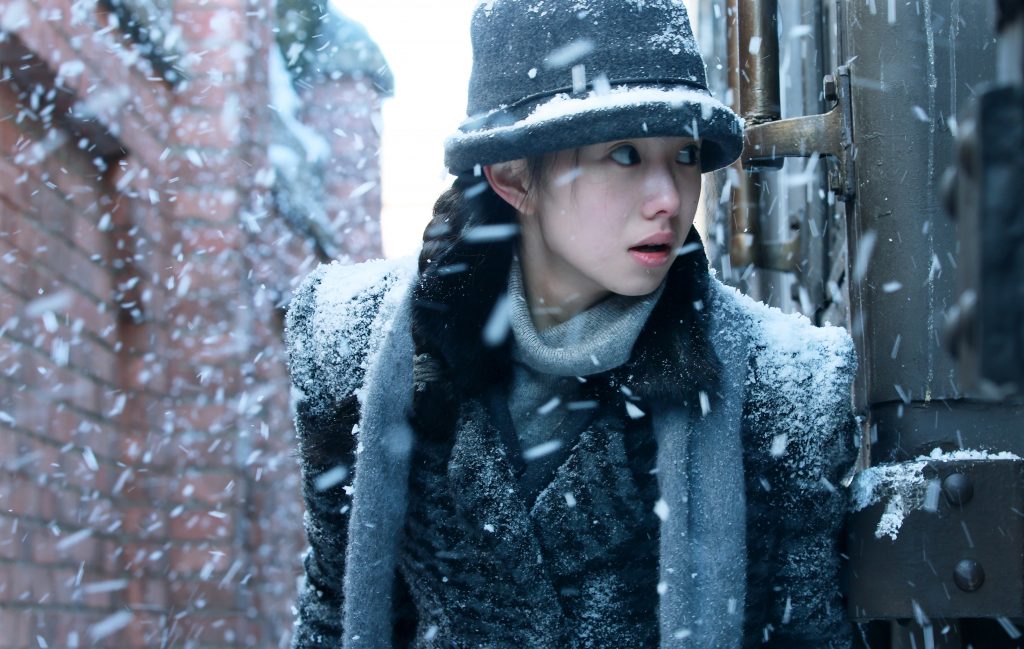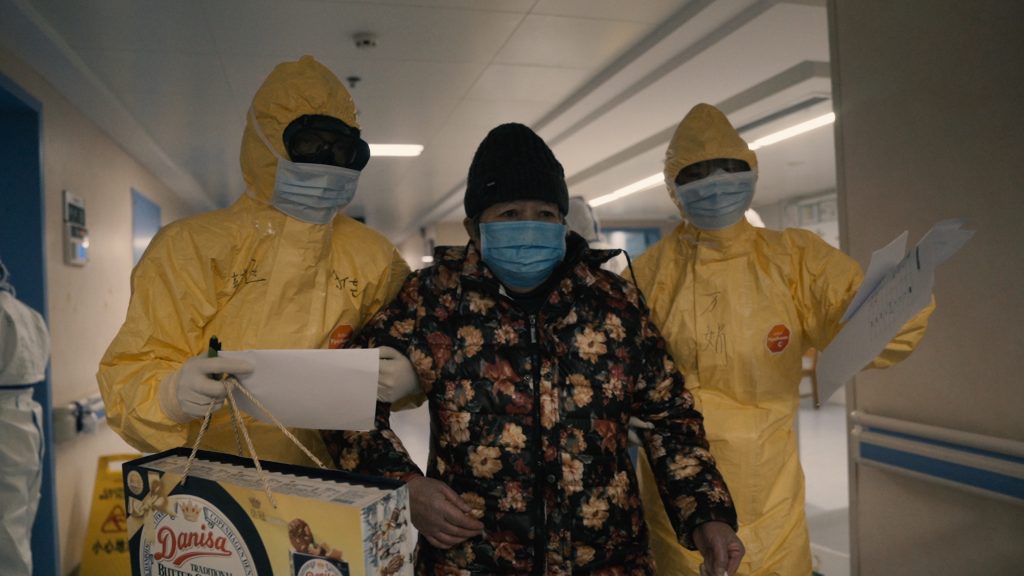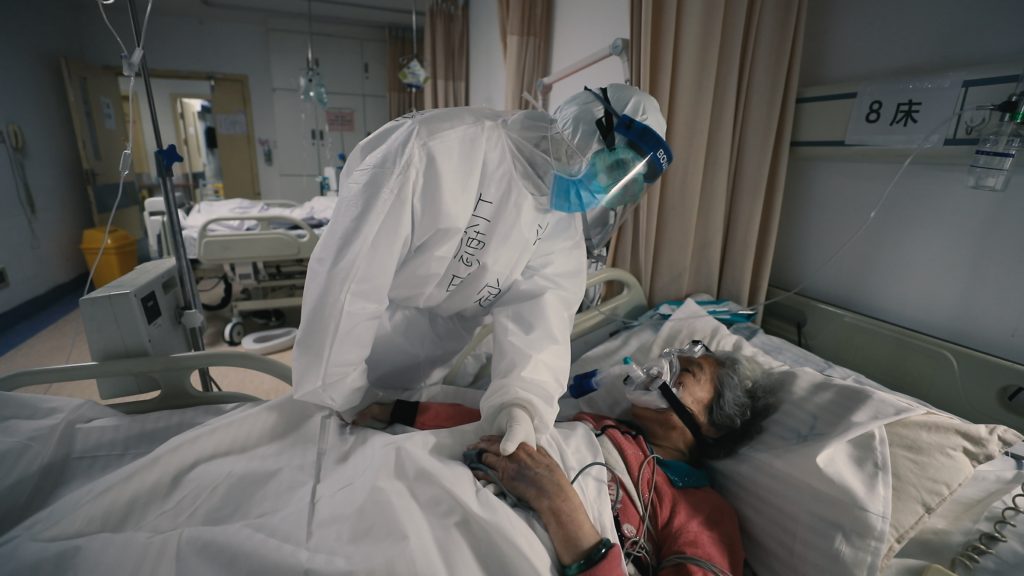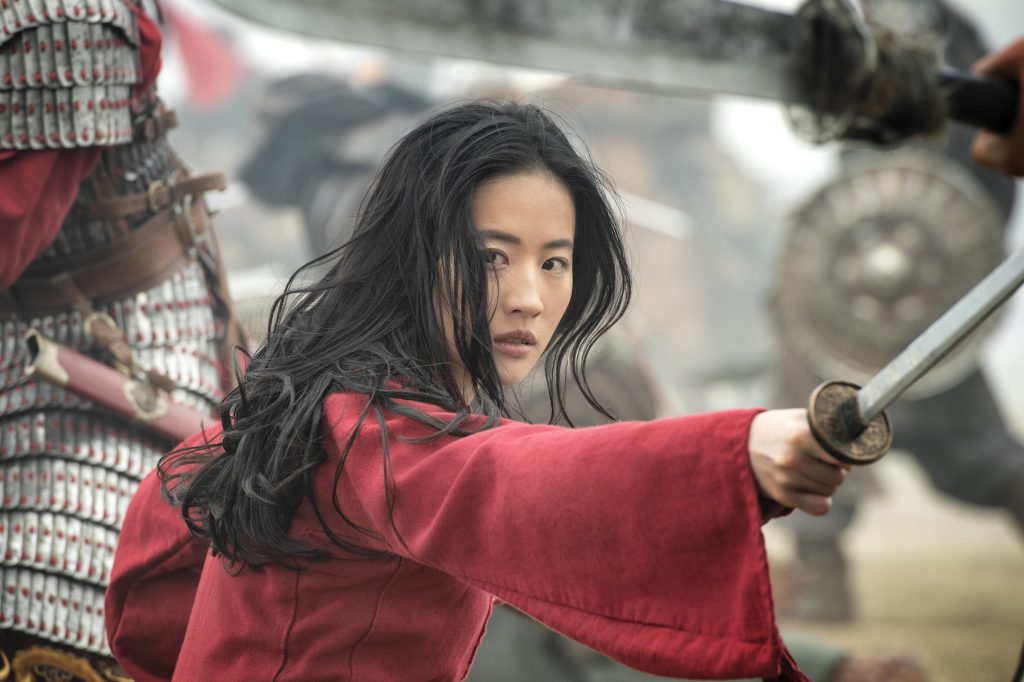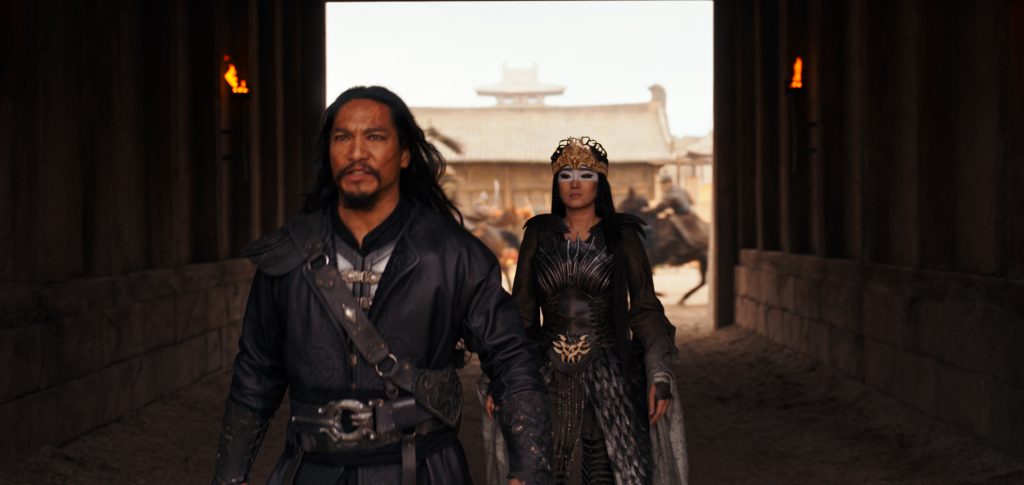November 14, 2021
by Carla Hay
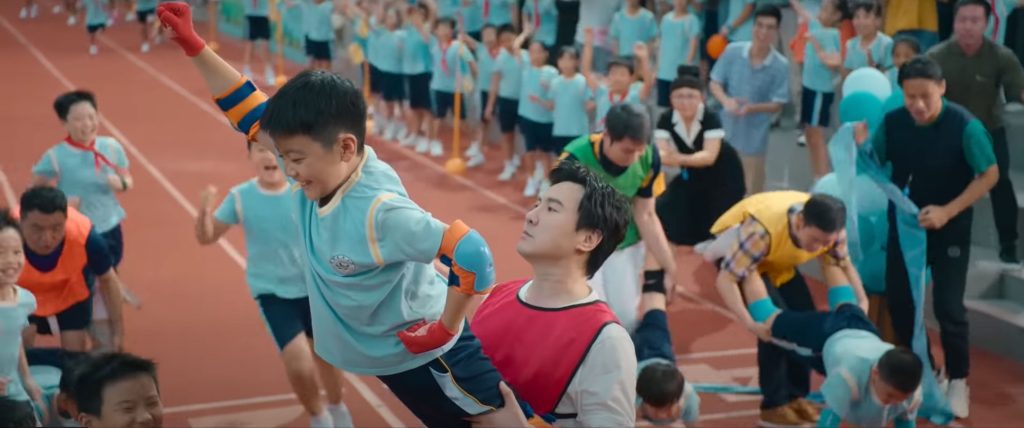
Directed by Wu Jing, Zhang Ziyi, Xu Zheng and Shen Teng
Mandarin with subtitles
Culture Representation: Taking place in China in 1942 to 1945; 1969; 1978; and the 21st century, the dramatic four-part anthology film “My Country, My Parents” (also titled “My Country, My Family”) features an all-Asian cast of characters representing the working-class and middle-class.
Culture Clash: The movie tells four separate stories of struggles and conflicts over parental issues.
Culture Audience: “My Country, My Parents” will appeal primarily to people who are interested in movies about Chinese culture and about universal issues over parents or guardians who try to do the best they can for their children.
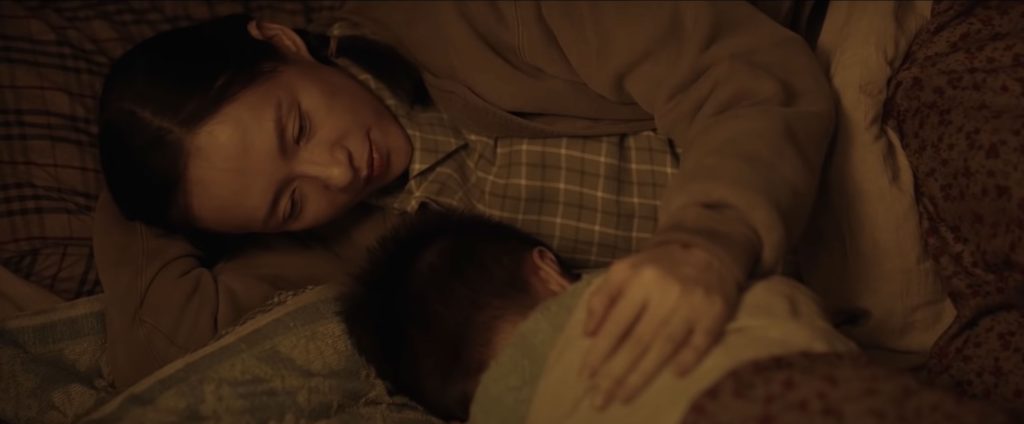
The dramatic anthology film “My Country, My Parents” is an uneven but still-interesting film with enough entertaining and emotionally moving moments that outweigh the moments when the movie falters with dull predictability. It’s a movie that is told in four parts (or four short films strung together), each from a different director who stars in each of the four stories. The four stories are “Windriders,” “Poem,” “Ad Man” and “Go Youth.” “My Country, My Parents” (which is also titled “My Country, My Family”) is the follow-up to 2019’s seven-part anthology film “My People, My Country” and 2020’s five-part anthology film “My People, My Homeland.” All of these films were created to put an emphasis on Chinese patriotism through the lens of stories about humanity and personal relationships.
“Windriders” (directed by Wu Jing)
“Windriders” is the first story in “My Country, My Parents.” Taking place from 1942 to 1945, during the Second Sino-Japanese War, it’s exactly what you might expect from a war movie. Wu Jing stars as Ma Renxing, a widower and a commander of the Jizhong Cavalry Regiment. He often clashes with his impulsive and equally stubborn son Ma Chengfeng (played by Leo Wu), who argues with his father, especially about who will get to ride a stallion called Big Boss.
Battle scenes on horseback get a lot of screen time. Although this story throws in some tragedy and sentimentality, “Windriders” puts more priority on the war action. Most viewers won’t find much to emotionally connect with or relate to in this story, unless you’ve had the experience of going into war combat with a parent or child. The filmmaking for this story isn’t bad, but it’s ultimately forgettable.
“Poem” (directed by Zhang Ziyi)
“Poem” takes almost the opposite approach of “Windriders,” by pouring on so many emotions and so much angst, it almost becomes a mini-melodrama. Zhang Ziyi stars as Yu Kaiying, a gunpowder sculptor in 1969. She has gone through two major tragedies within a 10-year period: The biological father of her two children died while serving in the military. He passed away when the kids were too young to remember him. (Du Jiang plays the father in a flashback.) And now, the children’s stepfather Shi Ruhong (played by Huang Xuan), the only father the kids have ever known, has died, also while serving in the military.
In 1969, her two children are a son nicknamed Four Eyes (played by Yuan Jinhui), who is about 7 or 8 years old, and an unnamed daughter (played by Ren Sinuo), who’s about 4 or 5 years old. Yu Kaiying is so devastated by Shi Ruhong’s death that she doesn’t know how to tell her kids, And so, she lies to them by saying that Shi Ruhong is still away from home because of military duties.
However, Four Eyes knows something is wrong because several other children in the neighborhood have missing fathers who disappered during military duty and are presumed dead. He begins to suspect that the only father he’s ever known has met the same fate, and he starts to ask questions. This leads to Yu Kaiying reminiscing about her courtship with Shi Ruhong, who liked to write poems to her.
Everything in “Poem” is bathed in warm-tinted cinematography (in dark gold and tawny), as if to give the movie a romantic glow. However, there are some harsh realities in the story that might be hard for some people to watch. Yu Kaiying is far from being an ideal parent. One day, Four Eyes has a tantrum and yells at her that she’s not a real father because his father used to spank him. She loses her temper and starts spanking Four Eyes until he’s in a sobbing heap. His younger sister witnesses this abuse and starts crying too.
Yu Kaiying shows remorse to her children for losing control of her emotions in such a negative way. The kids forgive her, but some viewers might lose any sympathy for Yu Kaiying during this domestic violence scene. It’s a jarring contrast to all the lovey-dovey courtship scenes in “Poem.” The story concludes by showing Yu Kaiying’s children as adults and what they ended up doing with their lives.
“Ad Man” (directed by Xu Zheng)
“Ad Man,” which takes place in 1978, is a welcome relief from the death and destruction of the previous two stories. The movie is a lighthearted story starring Xu Zheng as Zhao Pingyang, a struggling entrepreneur who decides to film his first TV commercial for his business of selling medicinal wine. He has bought so much wine, that it’s cluttered up his modest home that he shares with his wife Han Jingya (played by Song Jia) and their son Zhao Xiaodong (played by Han Haolin), who’s about 10 or 11 years old.
Zhao Xiaodong is so embarrassed by his father that he lies about what his father does for a living. The movie opens with Zhao Xiaodong giving a presentation in front of other students in a classroom where they have to talk about their fathers’ jobs. Zhao Xiaodong says with false pride that his father has been an architect, furniture maker, and he became the top sales manager at a pharmaceutical company. He also brags that his father predicted that phones without cords would be invented.
In the middle of this presentation, a boy stands up in class and says that Zhao Xiaodong is lying about everything. The boy announces that Zhao Pingyang is really a financially broke “loser” who’s heavily in debt and who used to sell duck eggs in front of the school. Zhao Xiaodong is so angry by what this boy says that he throws a book at him and gets in trouble for it. However, it’s true that Zhao Pingyang has serious financial problems and that he used to sell duck eggs in front of the school.
Zhao Pingyang’s wife Han Jingya is so upset with him for putting the family in a financial mess that she’s on the verge of divorcing him. Zhao Xiaodong makes it clear to his father that he’s also ashamed of him. Partially out of desperation and partially out of inspiration, Zhao Pingyang decides the best way to jumpstart his failing business is to film a TV commercial, which was still rare for small businesses in China in 1978.
Because he’s new to TV advertising, many mistakes are made, resulting in some comedic scenes. Zhao Pingyang ends up hiring a film crew of eccentric people. And eventually, he decides to star in the commercial himself. Is the commercial a success? Does he eventually get the respect of his wife and son? This is a feel-good story, so you can predict the rest.
“Go Youth” (directed by Shen Teng)
The best story in the movie is saved for last. “Go Youth” is a dramedy set in 2020, when a talking male robot (played by Shen Teng) from outer space has been sent to Earth and crash-lands in a field. He gets dismembered in the fall, but he puts himself back together. The robot eventually finds its way to the home of a boy named Xiao Xiao (played by Hong Lie), who’s about 7 or 8 years old. Xiao Xiao is the only child of his widow mother Ma Daiyu (played by Ma Li), who spends a lot of time away from home, presumably because she has to work.
Xiao Xiao finds that he can control the robot by telling it what to do. The robot is named Xing Yihao, and he tells Xiao Xiao that he’s from the year 2050. “I’m fresh from the production line,” the robot says to Xiao Xiao. “They brought me here.” (Who are “they”? That question is answered at the end of the film in a delightful plot twist.)
The robot couldn’t have come at a better time in Xiao Xiao’s life. Xiao Xiao is a lonely child who’s being bullied at school by other kids. He can’t really talk about it with his mother, whom Xiao Xiao describes as “a nag.” Because Xing Yihao looks and acts like a real human being, Xiao Xiao pretends that the robot is his new father.
Xiao Xiao’s deceased father was a scientist/researcher whose specialty was artificial intelligence. Xiao Xiao also has an interest in computer-based science, so he easily bonds with the robot. At first, he treats Xing Yihao like a toy, but then he grows fond of the robot and starts treating it like a father figure/friend. A poignant moment happens when Xiao Xiao teaches the robot how to smile.
Xiao Xiao’s mother Ma Daiyu seems to give Xiao Xiao a lot of freedom to do things without adult supervision. She’s not around to see a lot of the shenanigans that Xiao Xiao gets up to with his new companion. Xiao Xiao and Xing Yihao spend a lot of time outdoors, where Xiao Xiao teaches Xing Yihao some things about how to live on Earth.
The robot also happens to have superhuman strength, which comes in handy when Xiao Xiao wants to fend off the school bullies, or to make a big impression in an upcoming athletic competition where fathers and sons pair up in teams. It’s during this athletic competition where Xiao Xiao sees that he and Xing Yih o,make a great team. It gives Xiao Xiao a lot of self-confidence, as well as respect from many of his classmates.
Xiao Xiao gets so emotionally attached to the robot, there’s a cute scene where Xiao Xiao introduces Xing Yihao to his mother as a blind date for her when she’s startled to see the robot for the first time. Xing Yihao is dressed in a spacesuit outfit when Ma Daiyu first sees the robot, so she thinks he’s a man who’s into cosplaying. No romance happens between the mother and the robot, but Xiao Xiao attempting to get his mother to like the robot is a sign that he wants Xing Yihao in his life for the long haul.
However, things don’t go as smoothly as Xiao Xiao would like. The robot keeps talking about having to go back to its place of origin. This kind of talk makes Xiao Xiao sad and confused, so he tries to ignore this robot’s wish to go back to its original home. Eventually, this issue can no longer be ignored, but how everything is resolved is not what a lot of viewers might expect.
“Go Youth” is the best story in this anthology because of how it’s heartwarming without being overly sentimental. It has the right blend of drama and comedy. And most of all, the dynamics between Shen Teng and Hong Lie are very entertaining to watch. Hong Lie is by far the most talented child actor in this anthology. He’s believable in every single scene. And although Shen Teng plays a robot, he brings glimmers of human empathy in the robot to make it an engaging character.
If there’s any noticeable flaw in all of this movie’s anthology stories, it’s in the sexist way that children who are girls are sidelined and not given much to do or say. In every story of this anthology, a male child is the only or main focus of a parent’s attention. Considering that Chinese culture is very patriarchal, it’s not too much of a surprise that male children are given more importance than female children in these stories. However, it’s commendable that a female director got to tell her story in this anthology. It might be gender tokenism to have only one female director out of four directors, but being part of the storytelling is better than being completely excluded.
CMC Pictures released “My Country, My Parents” in select U.S. cinemas on October 8, 2021. The movie was released in China on September 30, 2021.

